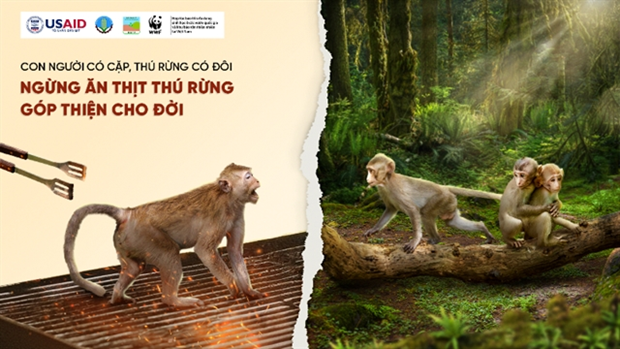
“The Vietnamese new year is a good occasion to reflect on our harmonious coexistence and stewardship for wildlife and nature as an imperative to appreciate and safeguard biodiversity and uphold the nation’s international conservation commitments," said Vu Van Hung, Director of Sustainable Forest Management and Biodiversity Conservation (VFBC) project.
Meanwhile, Director of Office of Climate Change, Energy, and Environment/USAID Vietnam Annie Wallace shared: "USAID stands with the Việt Nam government and all citizens in the collective effort to conserve the country’s wildlife and natural habitats. We encourage everyone to be active partners by becoming stewards of nature and wildlife and by helping to reduce demand for the consumption of wildlife.”
For generations, people in Vietnam have been consuming wildlife meat and other products. The persistent demand for these products has led to a severe decline in the populations of wildlife in the country's natural habitats.
A survey on wild meat consumption conducted by WWF-Vietnam in 2021 reveals that 90% of wild animals hunted illegally end up mainly in urban restaurants and the average consumption per a consumer of wildlife meat is seven times per year.
These crucial findings highlight the urgency of better action plans to reduce wildlife consumption across sectors and at multiple levels. This entails significant investment in increasing public awareness through communication channels to actively curb both the illegal wildlife trade and the consumption of wildlife meat.
Moreover, in the upcoming period, ongoing efforts are essential to strengthen the enforcement of biodiversity conservation laws, with a focus on integrating and implementing biodiversity conservation requirements into the national macro-policy planning process.
"While we work to support the improvement of law enforcement and conservation activities inside Việt Nam’s forest protected areas, to give wildlife populations a chance to survive and recover from the decades of decline, it’s crucial to stop the illegal consumption of wildlife meat," said Nick Cox, Chief of Party, USAID Biodiversity Conservation project, WWF.
The campaign is promoting its messages through social media platforms and public engagement activities across the country./.VNS